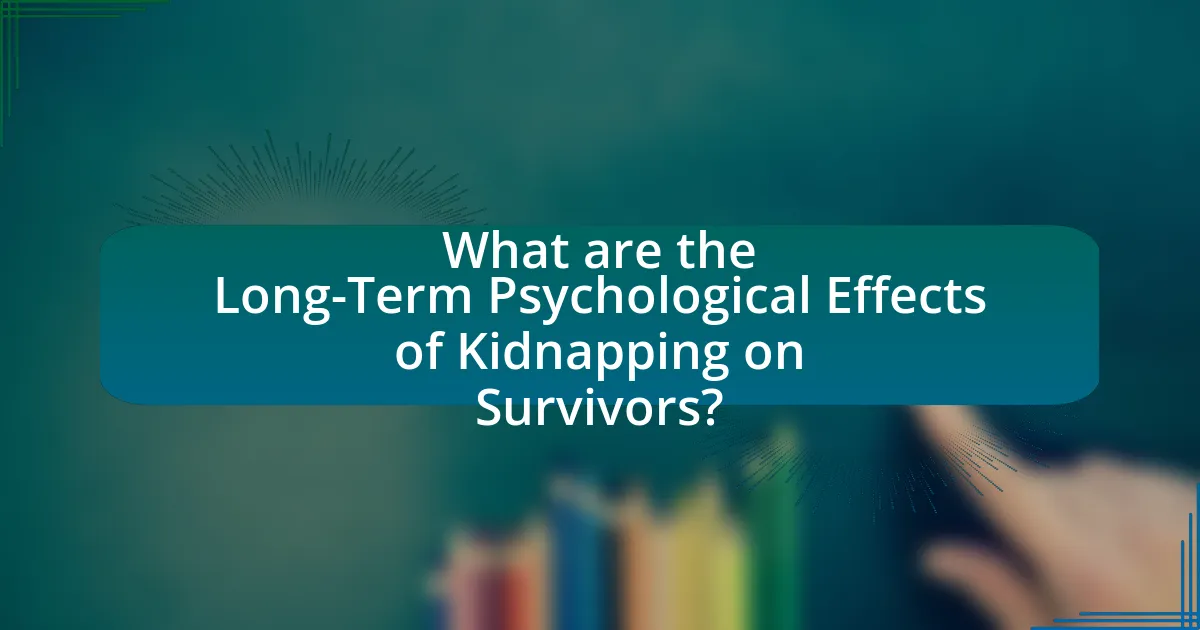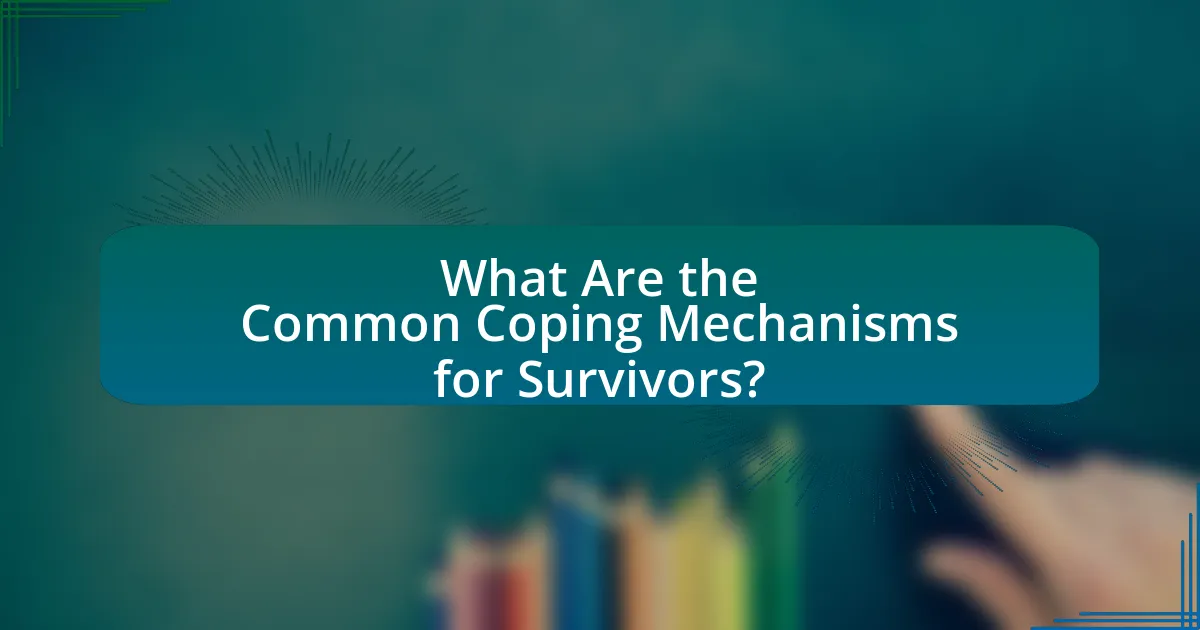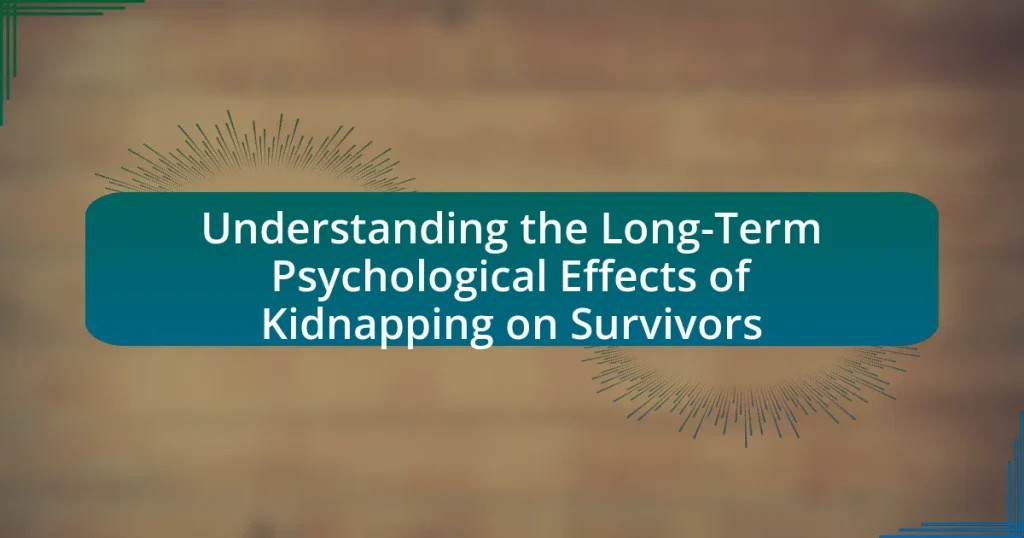The article focuses on the long-term psychological effects of kidnapping on survivors, highlighting conditions such as post-traumatic stress disorder (PTSD), anxiety, and depression. Research indicates that approximately 30% of survivors develop PTSD, which can lead to significant impairments in daily functioning and interpersonal relationships. The article explores various factors influencing these psychological outcomes, including the duration and nature of captivity, the survivor’s background, and pre-existing mental health conditions. It also discusses effective coping mechanisms and therapeutic approaches, emphasizing the importance of awareness and support systems in the recovery process. Understanding these effects is crucial for developing targeted mental health interventions and prevention strategies for survivors.

What are the Long-Term Psychological Effects of Kidnapping on Survivors?
The long-term psychological effects of kidnapping on survivors include post-traumatic stress disorder (PTSD), anxiety, depression, and difficulties in interpersonal relationships. Research indicates that approximately 30% of kidnapping survivors develop PTSD, characterized by flashbacks, severe anxiety, and uncontrollable thoughts about the traumatic event. Survivors often experience heightened levels of anxiety and depression due to the trauma, which can persist for years. Additionally, many individuals face challenges in forming and maintaining relationships, stemming from trust issues and emotional detachment. Studies have shown that these psychological effects can significantly impair daily functioning and quality of life, highlighting the need for targeted mental health interventions for survivors.
How does kidnapping impact mental health in the long run?
Kidnapping significantly impacts mental health in the long run, often leading to conditions such as post-traumatic stress disorder (PTSD), anxiety, and depression. Survivors frequently experience intrusive memories, hyperarousal, and emotional numbing, which can persist for years after the traumatic event. Research indicates that approximately 30% of kidnapping survivors develop PTSD, highlighting the severity of the psychological effects. Additionally, long-term studies show that these individuals may struggle with trust issues, relationship difficulties, and a heightened sense of vulnerability, further complicating their mental health landscape.
What specific psychological disorders are commonly observed in survivors?
Survivors of kidnapping commonly experience psychological disorders such as post-traumatic stress disorder (PTSD), depression, anxiety disorders, and complex trauma. Research indicates that PTSD is particularly prevalent, with studies showing that approximately 30% of kidnapping survivors develop this disorder, characterized by flashbacks, severe anxiety, and uncontrollable thoughts about the traumatic event. Additionally, depression and anxiety disorders are frequently reported, with symptoms including persistent sadness, loss of interest in activities, and heightened levels of worry. Complex trauma, resulting from prolonged exposure to traumatic events, can lead to difficulties in emotional regulation and interpersonal relationships. These disorders highlight the significant psychological impact that kidnapping can have on survivors, necessitating targeted mental health interventions.
How do these disorders manifest over time?
Disorders resulting from kidnapping manifest over time through a range of psychological symptoms, including post-traumatic stress disorder (PTSD), anxiety, depression, and dissociative disorders. Survivors may initially experience acute stress reactions, which can evolve into chronic conditions characterized by persistent flashbacks, hypervigilance, and emotional numbing. Research indicates that approximately 30% of kidnapping survivors develop PTSD, with symptoms often worsening if left untreated. Over time, these disorders can lead to significant impairments in daily functioning, relationships, and overall quality of life, as evidenced by longitudinal studies showing that untreated psychological trauma can persist for years, affecting survivors’ mental health and social reintegration.
Why is it important to understand these effects?
Understanding the long-term psychological effects of kidnapping on survivors is crucial for developing effective therapeutic interventions. These effects can include post-traumatic stress disorder (PTSD), anxiety, and depression, which significantly impact a survivor’s quality of life. Research indicates that approximately 30% of kidnapping survivors experience PTSD, highlighting the need for targeted mental health support. By comprehending these effects, mental health professionals can tailor treatment plans that address specific trauma-related symptoms, ultimately aiding in the recovery process and improving overall well-being for survivors.
What role does awareness play in recovery for survivors?
Awareness plays a crucial role in the recovery of survivors by facilitating self-recognition of trauma and its effects. This understanding allows survivors to identify their emotional and psychological responses, which is essential for effective coping strategies. Research indicates that survivors who develop awareness of their trauma are more likely to engage in therapeutic practices, leading to improved mental health outcomes. For instance, a study published in the Journal of Traumatic Stress found that increased awareness correlates with lower levels of PTSD symptoms among survivors. Thus, awareness not only aids in recognizing the impact of trauma but also empowers survivors to seek help and engage in their healing process.
How can understanding these effects aid in prevention efforts?
Understanding the long-term psychological effects of kidnapping on survivors can significantly enhance prevention efforts by informing targeted interventions and support systems. By recognizing symptoms such as PTSD, anxiety, and depression, stakeholders can develop tailored educational programs that raise awareness about the psychological aftermath of kidnapping. Research indicates that survivors often experience lasting trauma, which can lead to increased vulnerability to future victimization; thus, understanding these effects allows for the implementation of preventive measures that address both psychological recovery and resilience-building. For instance, studies show that early psychological support can mitigate long-term effects, suggesting that timely intervention strategies can be designed to protect at-risk populations more effectively.

What Factors Influence the Psychological Effects of Kidnapping?
The psychological effects of kidnapping are influenced by several key factors, including the duration of captivity, the nature of the abduction, the relationship between the victim and the captor, and the victim’s pre-existing mental health conditions. Research indicates that prolonged captivity can lead to more severe psychological trauma, as evidenced by studies showing that victims held for extended periods often experience higher rates of PTSD and anxiety disorders. Additionally, violent or abusive treatment during captivity exacerbates psychological harm, while a supportive social network post-release can mitigate these effects. The victim’s mental health history also plays a crucial role; individuals with prior trauma or mental health issues may be more vulnerable to severe psychological consequences following kidnapping.
How do the circumstances of the kidnapping affect survivors?
The circumstances of the kidnapping significantly affect survivors by influencing their psychological well-being and coping mechanisms. Factors such as the duration of captivity, the nature of the abduction, and the treatment received during captivity can lead to varying degrees of trauma. For instance, prolonged captivity often results in more severe post-traumatic stress disorder (PTSD) symptoms, as evidenced by studies indicating that survivors of long-term kidnappings report higher levels of anxiety and depression compared to those held for shorter periods. Additionally, the presence of physical abuse or threats during the kidnapping can exacerbate feelings of helplessness and fear, further complicating the survivor’s recovery process. Research has shown that these circumstances can lead to long-lasting emotional and psychological challenges, impacting the survivor’s ability to reintegrate into society and maintain relationships.
What is the impact of the duration of captivity on mental health?
The duration of captivity significantly impacts mental health, with longer periods often leading to more severe psychological consequences. Research indicates that extended captivity can result in heightened levels of anxiety, depression, and post-traumatic stress disorder (PTSD) among survivors. For instance, a study published in the Journal of Traumatic Stress found that individuals held for longer durations exhibited more intense PTSD symptoms compared to those with shorter captivity experiences. This correlation suggests that the length of time spent in captivity exacerbates mental health issues, leading to long-term psychological challenges for survivors.
How does the nature of the abduction influence psychological outcomes?
The nature of the abduction significantly influences psychological outcomes by determining the level of trauma experienced by the victim. Factors such as the duration of captivity, the treatment received during abduction, and the presence of threats or violence can exacerbate feelings of helplessness and fear, leading to conditions like post-traumatic stress disorder (PTSD). Research indicates that victims of prolonged and violent abductions report higher levels of anxiety, depression, and difficulty in social reintegration compared to those who experience shorter or less violent kidnappings. For instance, a study published in the Journal of Traumatic Stress found that individuals subjected to severe trauma during abduction exhibited more severe psychological distress and functional impairment than those with less traumatic experiences.
What role does the survivor’s background play in their recovery?
The survivor’s background significantly influences their recovery process. Factors such as socioeconomic status, cultural context, and previous trauma history can shape coping mechanisms and access to resources. For instance, survivors from supportive family environments often exhibit better resilience and recovery outcomes compared to those from dysfunctional backgrounds. Research indicates that individuals with prior exposure to trauma may experience heightened vulnerability during recovery, as noted in studies published in the Journal of Traumatic Stress, which highlight the correlation between background factors and psychological resilience.
How do age and gender affect the psychological impact of kidnapping?
Age and gender significantly influence the psychological impact of kidnapping, with children and females often experiencing more severe effects. Research indicates that children are particularly vulnerable due to their developmental stage, leading to heightened anxiety, post-traumatic stress disorder (PTSD), and difficulties in emotional regulation. A study published in the Journal of Traumatic Stress found that female survivors of kidnapping report higher levels of depression and anxiety compared to their male counterparts, likely due to societal expectations and stigma surrounding victimization. Additionally, age-related factors such as cognitive maturity and social support systems play a crucial role in shaping the psychological outcomes for different demographics.
What is the significance of pre-existing mental health conditions?
Pre-existing mental health conditions significantly influence the psychological outcomes of individuals who experience traumatic events, such as kidnapping. These conditions can exacerbate the effects of trauma, leading to heightened anxiety, depression, and post-traumatic stress disorder (PTSD) symptoms. Research indicates that individuals with a history of mental health issues are more vulnerable to developing severe psychological distress following traumatic experiences, as evidenced by a study published in the Journal of Traumatic Stress, which found that pre-existing conditions can double the risk of PTSD in trauma survivors. This underscores the importance of addressing mental health history in therapeutic settings for kidnapping survivors to tailor effective interventions and support.

What Are the Common Coping Mechanisms for Survivors?
Common coping mechanisms for survivors of kidnapping include seeking social support, engaging in therapy, practicing mindfulness, and utilizing creative outlets. Social support from friends, family, or support groups helps survivors feel understood and less isolated, which is crucial for emotional healing. Therapy, particularly trauma-focused cognitive behavioral therapy, has been shown to effectively address symptoms of PTSD and anxiety in survivors. Mindfulness practices, such as meditation and deep breathing, can reduce stress and improve emotional regulation. Additionally, creative outlets like art or writing allow survivors to express their feelings and experiences, facilitating processing and healing. These mechanisms are supported by research indicating their effectiveness in promoting resilience and recovery among trauma survivors.
How do survivors typically cope with their experiences?
Survivors typically cope with their experiences through a combination of psychological support, social connections, and personal coping strategies. Psychological support often includes therapy, which can help survivors process trauma and develop coping mechanisms. Social connections, such as support groups or relationships with family and friends, provide emotional support and validation, which are crucial for recovery. Personal coping strategies may involve mindfulness practices, journaling, or engaging in creative outlets, which can facilitate emotional expression and healing. Research indicates that these coping methods can significantly reduce symptoms of post-traumatic stress disorder (PTSD) and improve overall mental health outcomes for survivors.
What are the most effective coping strategies identified in research?
The most effective coping strategies identified in research for survivors of kidnapping include cognitive-behavioral therapy (CBT), social support, and mindfulness practices. Cognitive-behavioral therapy has been shown to help individuals reframe negative thoughts and develop healthier coping mechanisms, as evidenced by studies indicating significant reductions in PTSD symptoms among participants (Hofmann et al., 2012). Social support, including connections with family and friends, has been linked to improved emotional resilience and recovery outcomes, as highlighted in research by Taylor (2007), which emphasizes the importance of social networks in coping with trauma. Mindfulness practices, such as meditation and deep-breathing exercises, have been found to reduce anxiety and enhance emotional regulation, supported by findings from a meta-analysis conducted by Khoury et al. (2015) that demonstrates the efficacy of mindfulness in improving psychological well-being.
How can support systems enhance these coping mechanisms?
Support systems can enhance coping mechanisms for survivors of kidnapping by providing emotional support, practical assistance, and a sense of belonging. Emotional support from family, friends, or support groups can help survivors process their trauma, reducing feelings of isolation and anxiety. Practical assistance, such as help with daily tasks or access to mental health resources, can alleviate stress and empower survivors to regain control over their lives. Research indicates that social support is linked to improved psychological outcomes, as seen in a study published in the Journal of Traumatic Stress, which found that individuals with strong support networks reported lower levels of PTSD symptoms. Thus, effective support systems play a crucial role in facilitating recovery and resilience among kidnapping survivors.
What therapeutic approaches are beneficial for survivors?
Cognitive Behavioral Therapy (CBT) and Eye Movement Desensitization and Reprocessing (EMDR) are beneficial therapeutic approaches for survivors of kidnapping. CBT helps survivors reframe negative thoughts and develop coping strategies, which is crucial for addressing anxiety and depression often experienced after trauma. Research indicates that CBT can significantly reduce symptoms of post-traumatic stress disorder (PTSD) in survivors, as evidenced by a meta-analysis published in the Journal of Traumatic Stress, which found that CBT is effective in improving psychological outcomes for trauma survivors. EMDR, on the other hand, facilitates the processing of traumatic memories, allowing survivors to integrate their experiences and reduce emotional distress. Studies, such as those published in the Journal of EMDR Practice and Research, demonstrate that EMDR can lead to significant reductions in PTSD symptoms, making it a valuable option for survivors seeking recovery.
How does trauma-informed care support recovery?
Trauma-informed care supports recovery by creating a safe and supportive environment that acknowledges the impact of trauma on individuals. This approach emphasizes understanding the effects of trauma, fostering trust, and empowering survivors, which can significantly enhance their healing process. Research indicates that trauma-informed care leads to improved mental health outcomes, as it reduces re-traumatization and promotes resilience among survivors. For instance, a study published in the Journal of Traumatic Stress found that trauma-informed practices can lead to decreased symptoms of PTSD and anxiety in individuals who have experienced traumatic events, including kidnapping.
What role does group therapy play in the healing process?
Group therapy plays a crucial role in the healing process for survivors of kidnapping by providing a supportive environment where individuals can share their experiences and feelings. This therapeutic setting fosters a sense of community and belonging, which is essential for emotional recovery. Research indicates that group therapy can significantly reduce symptoms of PTSD and anxiety, as participants often find solace in knowing they are not alone in their struggles. A study published in the Journal of Traumatic Stress found that survivors who engaged in group therapy reported improved emotional regulation and a decrease in feelings of isolation, highlighting its effectiveness in the healing journey.
What practical steps can be taken to support survivors of kidnapping?
To support survivors of kidnapping, it is essential to provide immediate psychological care, establish a safe environment, and facilitate access to ongoing mental health services. Immediate psychological care helps address trauma symptoms, while a safe environment fosters a sense of security, crucial for recovery. Access to ongoing mental health services, including therapy and support groups, is vital for long-term healing, as studies indicate that survivors often experience PTSD, anxiety, and depression. Research shows that structured support systems significantly improve recovery outcomes for trauma survivors, reinforcing the importance of these practical steps.


